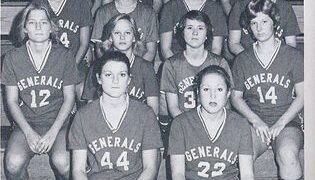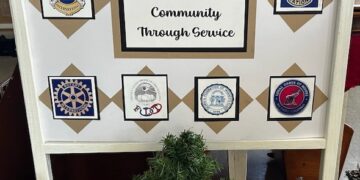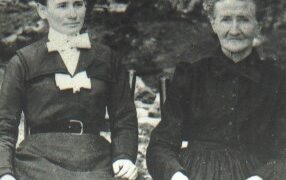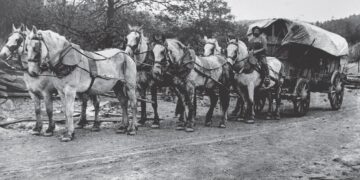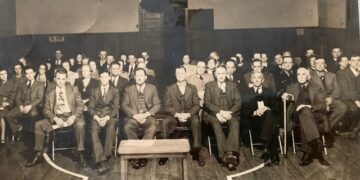In our last two articles, we discussed the ‘big two’ southern gospel recording labels – Canaan Records and HeartWarming Records. These two companies were industry leaders in the southern gospel genre from the late 1960s well through the early-to-mid 1980s.
While both companies were highly reputable, many smaller singing groups, namely those that were only traveling locally and/or regionally, felt that achieving ‘national’ status was out of reach, unless they happened to secure a record deal with Canaan or HeartWarming. These local and regional groups were making records either entirely themselves, or with the help of a local recording studio. In most cases, the end result was sub-par, and radio airplay was restricted to a handful of stations in their immediate area.
Fortunately, in 1977, a new record company was founded that sought to give such groups a ‘leg up’: the Eddie Crook Company.
Eddie Crook Company
Eddie Crook had toured with groups like the Tennesseans, the Plainsmen Quartet, and, most notably, the Happy Goodman Family, serving as their pianist. He began producing records in 1969, and, in 1977, launched the Eddie Crook Company (ECC).
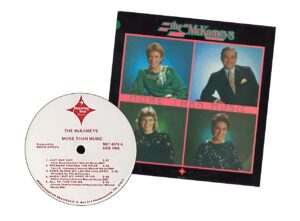
ECC grew, of course, as the 1980s progressed, and soon developed three record labels. Groups that were first signed to ECC would record for Eddie Crook Productions (ECP). If their career in gospel music looked promising, they would be promoted to Harvest Records. From Harvest, groups would ‘graduate’ to MorningStar, the company’s premier recording label.
Perhaps the best way to describe the Eddie Crook Company, often referred to as a ‘development label’, was, simply put, that it gave smaller groups a fighting chance at ‘making it big’ the southern gospel industry. Once signed to a label, ECC provided them with the resources (songwriters, musicians, etc.) to produce an album that could compete on a national level. Furthermore, ECC would provide the artist with a great deal of radio promotion.
And here is where the Eddie Crook Company seemed to excel: radio promotion. Contrary to what some may think, even to this day, radio stations rarely buy albums themselves; they depend on the record labels to ‘service’ them with the latest songs from their respective artists, known as ‘singles’. Sometimes the company will send the full album/CD, but many times, the company will send a ‘compilation CD’ each month or two featuring the current singles from their artists. Back in the day, of course, the record companies were sending out 45s to radio stations.
In reading some issues of Singing News Magazine from the late 1980s, I discovered something rather interesting. A number of southern gospel radio stations were surveyed nationwide and reported ‘poor’ record service from a handful of companies. Surprisingly, many mentioned the ‘big two’: Canaan and HeartWarming/RiverSong. The best radio service? A vast majority indicated the Eddie Crook Company. In fact, some stations noted that ECC releases made up a vast majority of their playlists simply because they were the only records they had to play. Granted, though, ECC was only supplying stations with 45 rpm singles for budgetary reasons, but noted that full albums would be available upon request.
Perhaps you’ve never heard of the Eddie Crook Company, nor its labels like Harvest Records and/or MorningStar. Chances are, though, if you’ve followed southern gospel music for quite some time, you’ll most certainly know some of the groups that got their start with ECC: the Bishops, McKameys, Perrys, Hayes Family, Greenes, Wilburns, and the Perry Sisters, among others. By the late 1980s, most of these groups were easily charting in the top 10 on the Singing News national airplay charts. Harvest Records was eventually replaced by CedarHill Records in the 1990s, and MorningStar continued into the early 2000s.
Availability Of Eddie Crook Company Releases
Syntax Creative currently controls the masters for Eddie Crook’s MorningStar label. One can find some ‘classic’ MorningStar albums from groups such as the Bishops, Perrys, and Wilburns on digital streaming platforms. While available information is somewhat limited, it does appear that many of the master tapes have yet to be transferred to a digital format.
It should also be noted that many of these smaller companies, including ECC, offered groups the opportunity to purchase their master tapes for themselves. This appears to have been the case with the McKameys. Their online store features ‘double CDs’ of their MorningStar releases from the 1980s.
So, the ‘big two’ had competition. Ultimately, this helped southern gospel grow tremendously throughout the 1980s, as companies like ECC introduced listeners to dozens of new groups, each with their own unique style. Next month we’ll conclude our series by discussing another development label, WindChime, plus some labels that came about in the late 1980s.

